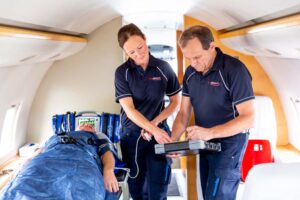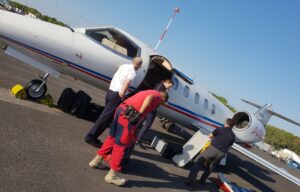The decision to charter an air ambulance is usually taken once other options have been ruled out, such as a medically escorted repatriation on a commercial airline in a business class seat or on a stretcher. Commercial flight options may not be possible due to medical or logistical reasons, and during the Covid-19 pandemic there was a dramatic reduction in the number of commercial flights operating internationally. Many international borders have been closed to foreign nationals, including medical escorts, and healthcare systems, particularly those in developing nations, have struggled to meet the healthcare demands placed on them due to the sheer volume of COVID-19 admissions. Because of this, a private air ambulance may be the only option for those patients who require urgent medical repatriation.
It is the responsibility of the medical assistance company, working alongside the air ambulance operator, to mitigate costs to clients as much as possible, whilst always putting patient welfare as the highest priority. Each air ambulance charter also represents a significant carbon footprint, and whilst this may be both unavoidable and medically justifiable, reducing the carbon footprint, through the utilisation of empty legs and multiple patients, should always be considered.
A Case Study
Dubai – Abidjan – Accra – Rijeka – St Petersburg
Med ResQ Ltd had been managing the cases of three separate patients,
Patient A – A 46-year-old male from Ivory Coast who was hospitalised in Dubai, UAE seven weeks earlier with a severe haemorrhagic stroke. He was haemodynamically stable and self-ventilating, but he had no power on his right side, a significant neurological deficit, was very confused and agitated, and completely bed-bound with full nursing care needs.
Patient B – A 63-year-old Croatian male who was hospitalised in Accra, Ghana with bilateral pneumonia and COVID-19. CT imaging revealed significant lung damage, with evidence of pulmonary haemorrhages and fibrosis, and he required over 14 days of in-hospital oxygen and adjunctive therapies. The patient would require supplemental oxygen for flight, although no commercial airline option was possible.
Patient C – A 63-year-old Russian male who was also hospitalised in Accra, Ghana with bilateral pneumonia and COVID-19. Clinically, he required over 14 days of in-hospital oxygen and adjunctive therapies and, as with patient B, was suffering from the on-going effects of COVID-19. He too would require physical support as well as supplementary oxygen for flight
Med ResQ discussed the logistics of combining a mission to repatriate Patient A to the Ivory Coast before performing a double stretcher mission from Ghana back to St Petersburg via Rijeka for patients B and C.
The combined mission schedule was created and was presented to two of Med ResQ’s clients with the cost savings split proportionately between each client, rather than one paying full price and one getting a larger empty leg discount. Both clients were aware of the combined mission and agreed to cooperate through Med ResQ accordingly.
Whilst the combined mission offered significant cost saving, the logistics of transferring three patients between three continents and five different countries were significant.
Flight Logistics
Landing Permissions Required – 10
Overfly Permits – 12
Refuel Stops – 10
Ground Ambulances – 6
Total Flying Distance – 20,000 km
Given the scale of the planning and logistics operation and the potential knock-on implications of any unforeseen delays, every part of the mission had to be meticulously planned and then checked again. The clinical needs of each patient were carefully reviewed by both the Med ResQ and Air Ambulance medical teams and fit to fly calls were conducted for each patient before the air ambulance team departed their base to complete each sector of the mission. The Med ResQ operations team worked closely with ground agents in each country to reconfirm each transfer at several stages during the mission. The flight was carried out seamlessly and all patients were safely repatriated home for further treatment.





